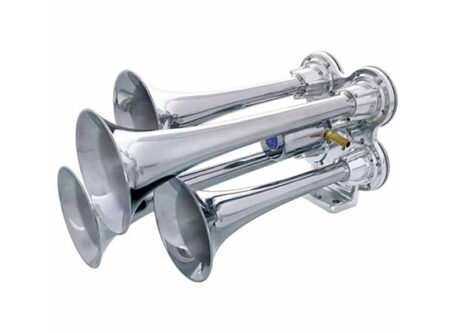U.S. Chamber of Commerce, trucking groups challenge Advanced Clean Trucks reg
The U.S. Chamber of Commerce and several trucking associations are the latest groups to weigh in on California’s controversial Advanced Clean Trucks regulation, calling it “arbitrary and capricious.”
On Monday, Nov. 13, the U.S. Chamber of Commerce, American Trucking Associations, Truckload Carriers Association, National Tank Truck Carriers and Specialty Equipment Market Association filed a joint amicus brief in the U.S. Court of Appeals for the District of Columbia Circuit opposing California’s Advanced Clean Trucks regulation.
In its brief, the coalition argues that the U.S. Environmental Protection Agency’s waiver of preemption that gives California the green light to follow through with the Advanced Clean Trucks regulation is not technologically feasible and fails to address downstream emissions caused by switching to battery-electric trucks.
Advanced Clean Trucks background
The Advanced Clean Trucks regulation is California’s attempt to move diesel-powered heavy trucks to greener technology.
Several years in the making, this program under the California Air Resources Board would require half of all new heavy-duty vehicle sales to be electric.
Manufacturers who certify Class 2b-8 chassis or complete vehicles with combustion engines would be required to sell zero-emission trucks as an increasing percentage of their annual California sales from 2024 to 2035. By 2035, zero-emission truck/chassis sales would need to be 55% of Class 2b-3 truck sales, 75% of Class 4-8 straight truck sales and 40% of truck tractor sales.
Federal law preempts states from establishing their own emission standards. However, the Clean Air Act carves out a path for California, and only California, to obtain a waiver from the EPA to establish its own standards.
That waiver of preemption was granted in March. According to the Clean Air Act, once California receives a waiver of preemption, other states can choose to adopt those standards.
EPA waiver ignores unintended consequences of Advanced Clean Trucks
EPA’s waiver was promptly challenged in federal court, with the latest challenge calling the EPA’s decision arbitrary and capricious.
In its amicus brief, the U.S. Chamber of Commerce and trucking associations argue the EPA’s determination was improper under multiple statutory criteria.
The Clean Air Act allows EPA to grant California a waiver if the proposed standards are at least as protective of the public health and welfare as applicable federal standards. In its amicus brief, the coalition argues that California’s protectiveness determination was arbitrary and capricious.
CARB’s Advanced Clean Trucks regulation claims to reduce emissions of various pollutants and greenhouse gases from medium- and heavy-duty trucks by requiring manufacturers to produce zero-emission vehicles. However, the coalition argues that California did not consider the unintended consequences of such a mandate.
“California did not adequately address the development of the infrastructure or the procurement of raw materials needed to support these vehicles on the road,” the amicus brief states. “Nor did California consider how requiring production of zero-emissions and electric vehicles would cause additional upstream and downstream emissions from producing the batteries and the electricity needed to power this fuel-independent system.”
Additionally, the coalition argues that the Advanced Clean Trucks regulation will incentivize the trucking industry to drive older, more polluting vehicles for longer periods.
Advanced Clean Trucks not technologically feasible
In addition to failing the protectiveness test, the U.S. Chamber of Commerce and trucking groups argue that the Advanced Clean Trucks regulation is not technologically feasible.
Before granting a waiver, the EPA must consider whether adequate technology is either presently available or already in existence and in-use. If that is not the case, then the agency must consider whether California has provided adequate lead time for the development and application of necessary technology. The coalition argues that the Advanced Clean Trucks regulation fails both of these prerequisites.
The coalition points out that there are currently no hydrogen fuel cell tractor-trailers available commercially. Furthermore, it could be more than a decade before such technology is developed.
Consequently, the Advanced Clean Trucks regulation forces the trucking industry to rely on battery-electric vehicles. However, commenters have suggested that “technical obstacles” and “significant costs” make those vehicles impractical.
One of those technical obstacles is the charging infrastructure, or the lack thereof. The amicus brief points out that the lack of a charging infrastructure poses significant issues for regional and interstate truck drivers.
According to the Clean Air Act, California must provide a mandatory four-year lead time for any waiver granted. However, the Advanced Clean Trucks regulation goes into effect Jan. 1, 2024. The coalition points out this is “well short of the four years Congress found necessary to provide for the research, development and production programs required to develop the new motor vehicle technology.”
Advanced Clean Trucks regulation labeled unconstitutional
The U.S. Chamber of Commerce and trucking groups’ amicus brief comes shortly after the initial petitioners to the federal court filed their brief that calls the Advanced Clean Trucks regulation unconstitutional.
In the brief, 19 state attorneys general and a coalition of stakeholders, including the Owner-Operator Independent Drivers Association, expressed concerns over the Advanced Clean Trucks regulation’s adherence to the equal-sovereignty doctrine.
The Clean Air Act allows California to create standards to address issues that are specific to the state. However, petitioners challenging the EPA’s waiver argue that California is attempting to solve climate change, which is a global phenomenon not unique to California.
“Even if the equal-sovereignty doctrine permits Congress to give California alone the power to regulate matters of unique importance to California, Congress cannot empower California alone to regulate a global problem like climate change,” the brief states. LL









